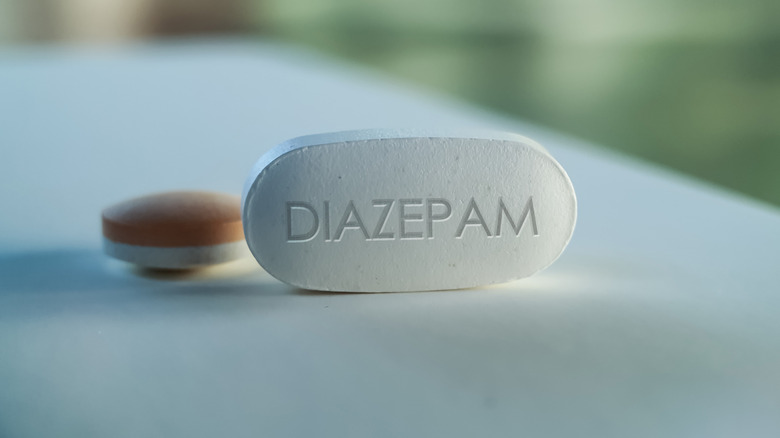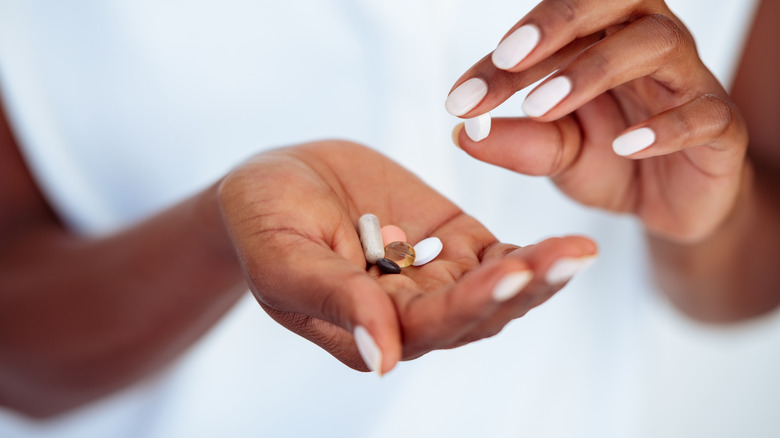This Is How Long It Takes For Valium To Start Working
According to a 2014 study published in the journal ACS Chemical Neuroscience, Valium is one of the most frequently prescribed medications in the United States, garnering more than 5 million prescriptions in 2019. The drug has been on the market for 56 years, first launching in 1963.
Valium is a brand name for the prescription drug known as diazepam. It treats various conditions, including anxiety, alcohol withdrawal, muscle spasms, and certain types of seizures (via Mayo Clinic). Drugs.com describes it as a benzodiazepine known to enhance the activities of specific neurotransmitters in the brain. Benzodiazepines come in various types, often classified by how long the effects last. The three main types include short-acting drugs with a median shelf life of 1 to 12 hours, immediate-acting drugs having an average shelf life of 12 to 40 hours, and long-acting ones ranging between 40 and 250 hours (via Healthline).
The American Academy of Family Physicians says benzodiazepines are commonly abused, and it's easy to become addicted if you're unaware of how the drug works and its onset of action. How long it takes for Valium takes to start working usually depends on the dosage, the form of administration, and the reason the drug has been prescribed.
How long does it take for Valium to start working?
According to Drugs.com, Valium is a long-acting benzodiazepine with rapid onset of action. A 2022 study published in the journal StatPearls notes that when administered through the veins, Valium can take as quickly as 1 to 3 minutes to start working. On the other hand, the tablet form can take up to 60 minutes to feel the effect, which can last up to 12 hours.
NHS UK further explains that diazepam, the main ingredient in Valium, can work faster or slower based on your condition. Also, there may be special dosage considerations for anxiety, muscle spasms, and seizures. Your door will prescribe your dosage based on factors like your condition, its severity, and other underlying issues (via Medical News Today). WebMD reiterates the need to consult a health expert before taking any dose. Furthermore, increasing the dose is no guarantee of quick improvements and can make you vulnerable to dependency and various other side effects.
Is Valium addictive?
Drug addictions are a public health crisis in the United States. The Centers for Disease Control and Prevention (CDC) notes that more than 93,000 persons in the U.S. died from drug-related overdose cases in 2020. Benzodiazepines were involved in nearly 7,000 overdose deaths in 23 states during the 2019 to 2020 period, accounting for around 17 percent of deaths caused by drug overdoses, per CDC. This claim of addiction is reiterated by the American Addiction Centers, which notes that valium is highly addictive and causes dependency.
As for side effects of Valium, death and serious illness from benzodiazepine abuse are rare. Unfortunately, abuse of the drug is widespread due to its availability (via WebMD). The source adds that Valium is frequently taken with alcohol and other medications, making the effects more lethal. Overdosing on benzodiazepine can cause individuals to experience symptoms like confusion or impaired mental status, coma and respiratory issues, slurred speech, and death, according to the CDC.
Healthline agrees with all the above claims noting that Valium has lost its place as the first choice for treating many conditions due to its addiction potential. People are more likely to become addicted if they need to take higher doses for longer amounts of time, against their doctor's advice, per the NHS. Given this, the best way to reduce your risk of becoming addicted to Valium is to adhere to your doctor's prescriptions — refrain from hiking up your dose just because of its convenience.



